February 4, 2025 | 11:37 GMT +7
February 4, 2025 | 11:37 GMT +7
Hotline: 0913.378.918
February 4, 2025 | 11:37 GMT +7
Hotline: 0913.378.918
Digital technology, business skills and environmental awareness have now become essential prerequisites for farmers. In this context, the process of intellectualizing farmers must be approached by designing training and educational programs that are closely aligned with the real-life needs and production practices of the farming community.
In the broader context of globalization and the ongoing digital transformation, the intellectualization of farmers has emerged as a crucial factor in building an ecological agriculture system, a modern rural environment and a civilized farming community.

The intellectualization of farmers is a key factor in building an ecological agricultural system, modern rural areas, and a civilized farming community. Photo: Kim Anh.
In Resolution No. 19-NQ/TW of the Central Committee of the Communist Party on agriculture, farmers, and rural areas until 2030, with a vision to 2045, the important role of intellectualizing farmers has been emphasized. This process involves improving the education and awareness of farmers, as well as ensuring their ownership and active participation in the context of digital transformation and the Fourth Industrial Revolution.
Drawing lessons from countries around the world, Dr. Tran Minh Hai, Vice President of the School of Public Policy and Rural Development (Ministry of Agriculture and Rural Development), affirmed that intellectualizing farmers is not only an objective but also a key to achieving sustainable agricultural development.
"Regardless of how diverse and abundant natural resources may be, unprofessional farmers will not be able to fully exploit the value of those resources. Intellectualizing farmers is not a mere movement; it is a continuous process that helps farmers progress step by step", Dr. Tran Minh Hai emphasized.
In this context, farmers' production cannot rely solely on experience. Digital technology, business skills and environmental awareness have become essential requirements. Therefore, intellectualizing farmers should be carried out in a way that connects the content of training programs with the practical needs of their everyday lives and agricultural production. This approach ensures that the education and skills development align with the real-world challenges and opportunities that farmers face.

Currently, farmers not only master modern farming techniques but also integrate rural tourism development, thereby increasing their income. Photo: Kim Anh.
Many regions have achieved remarkable results in shifting from traditional agricultural production to a agricultural economy. A prime example is Dong Thap Province, where farmers have not only mastered modern farming techniques but also creatively incorporated traditional cultural values to develop rural tourism products. This innovative approach has significantly boosted local income and provided new opportunities for the community.
In Binh Phuoc Province, farmers have pioneered an interesting method by raising bats in durian orchards to collect bat guano, which is then used as natural fertilizer for the crops. This model serves a dual purpose: it helps reduce production costs by replacing chemical fertilizers with organic alternatives, while also promoting environmental sustainability.
In a more recent example, in Chuong My District (Hanoi), the farming community has made strides in reducing their reliance on chemical pesticides. The farmers have collectively decided to switch to more eco-friendly farming practices, focusing on sustainable and environmentally responsible methods.
In addition, today’s farmers are moving away from relying on traditional farming tools and equipment. Instead, they are embracing digital technology, staying updated on market information, and acquiring skills for sustainable development, gradually transforming into "farm entrepreneurs" or "agripreneurs" in rural areas.
Building on these advancements, local specialized sectors, especially the Farmers' Association and the Department of Agriculture and Rural Development (DARD), are focusing on designing training programs and knowledge transfer initiatives that are customized for different groups of farmers. These programs will be tailored based on various factors such as the region, the specific characteristics of the farmers, and their areas of expertise. For instance, training may be conducted in group settings or through community leaders - selecting skilled and experienced farmers in certain fields to become trainers themselves. Alternatively, a broader approach could be adopted, offering diverse training in multiple fields to address the varied needs of different farmer groups.
Additionally, through international exchange programs and cooperative projects, there is a growing emphasis on promoting the sustainable and environmentally friendly role of farmers. Of particular importance is the active participation of female farmers in community-based programs, which is expected to have a powerful impact on the intellectualization process.
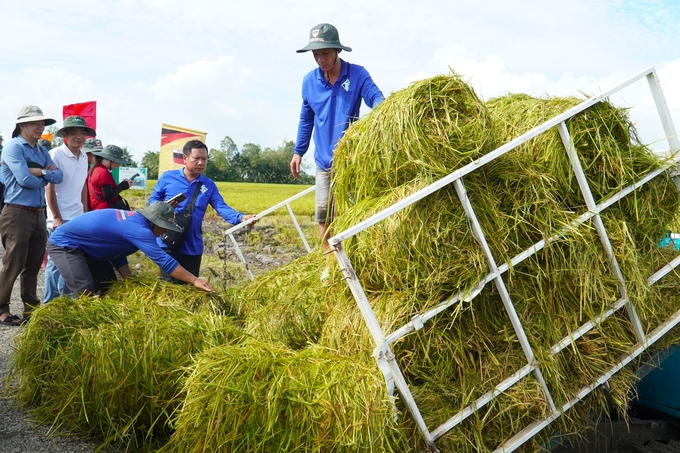
The journey of intellectualizing farmers will provide strong support for the project of 1 million hectares of high-quality rice. Photo: Kim Anh.
In particular, the Mekong Delta region is currently making significant efforts to implement the "1 Million Hectares of High-Quality Rice" project, which necessitates a more professional approach from farmers. According to expert Dr. Tran Minh Hai, the intellectualization process plays a crucial role in helping farmers reduce the amount of rice seed they use, cutting the quantity from 120-150 kg per hectare to a more efficient 80-100 kg per hectare. This reduction not only lowers production costs but also encourages farmers to adopt more sustainable practices. The intellectualization effort also promotes the reduction of chemical fertilizers in favor of using organic products such as biological and microbial fertilizers, as well as engaging in innovative practices like recycling rice straw to create value-added products.
From the perspective of private enterprises involved in the project, they are prepared to establish partnerships with the Farmers' Association to create a seamless, market-oriented production chain. To support this, specialized agencies at various levels will design and implement tailored training programs for farmers, helping them gain the skills and knowledge needed to fulfill the demands of businesses, thereby improving their marketability.
However, farmers participating in these cooperative efforts must be willing to adapt their methods and adopt more professional, market-oriented practices. If farmers resist or refuse to change their traditional farming techniques, businesses may not purchase their products.
This form of binding cooperation between farmers and businesses is designed to prevent the common issue of overproduction leading to price drops. Farmers will benefit from guaranteed contracts that offer higher purchase prices. As a result, farmers will be encouraged to move away from traditional, fragmented farming practices and come together to form more organized, professional linkages for greater success in the market.
Translated by Phuong Linh

(VAN) US president says he will hit Canada, Mexico, China and EU with levies as he targets major trading partners.

(VAN) A research study of bird flu viruses in cattle has shown that the H5N1 strain does not pose an increased threat to humans.
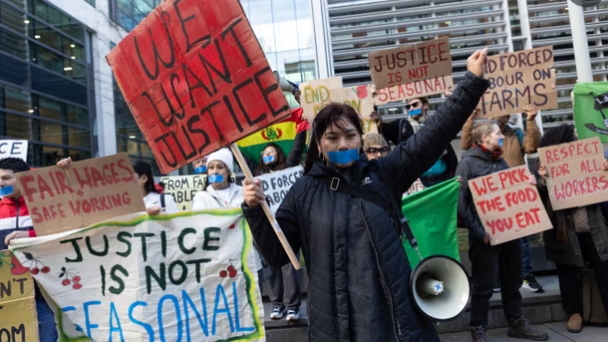
(VAN) In two actions, migrant workers claim exploitation while farmers demonstrate against inheritance tax plan.
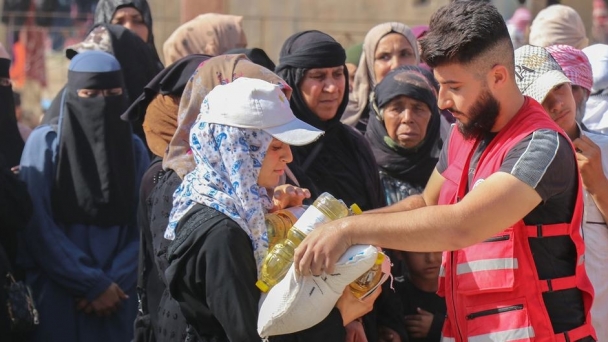
(VAN) From FAO Regional Office for Near East and North Africa.
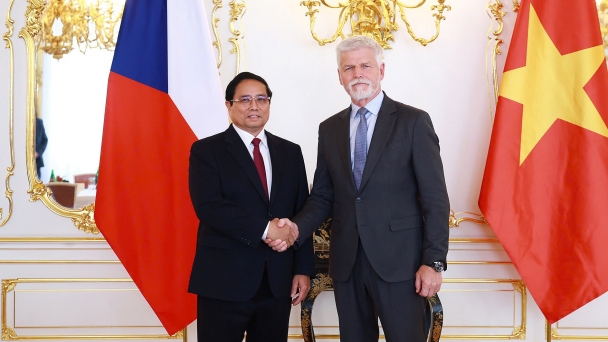
(VAN) President of the Czech Republic Petr Pavel affirmed his support for the EC to consider lifting the IUU 'yellow card' on Vietnam's seafood exports.
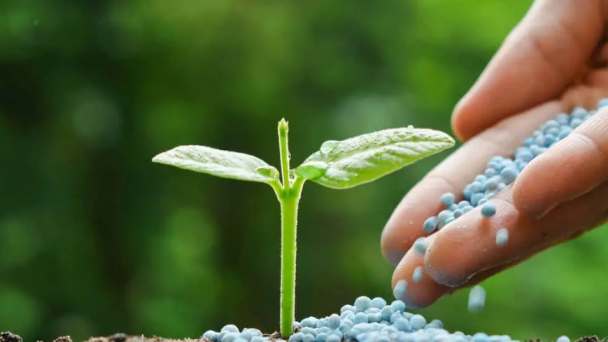
(VAN) Discover how a genetic mutation in plants enhances partnerships with soil microbes, reducing fertilizer use and boosting sustainable farming practices.

(VAN) This is the result after 5 years of implementing the project, which was carried out by the Ministry of Natural Resources and Environment in collaboration with the United Nations Development Programme (UNDP).